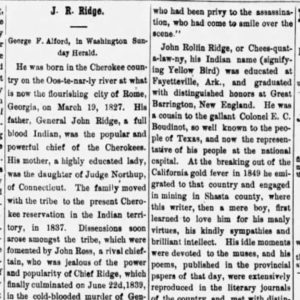calsfoundation@cals.org
John Rollin Ridge (1827–1867)
John Rollin Ridge was a Cherokee/Puritan novelist, poet, essayist, and newspaper editor who is recognized as the first Native American novelist for his 1854 work The Life and Adventures of Joaquin Muríeta: The Celebrated California Bandit.
John Rollin Ridge was born on March 19, 1827, in New Echota, Georgia. He was the grandson of Cherokee Chief Major Ridge and son of John Ridge, both wealthy slaveholding landowners and prominent tribal leaders in New Echota. His mother, Sarah Bird Northrup Ridge, descended from Puritans who landed in Boston in 1637. He often used the pen name Yellow Bird, an English translation of his Cherokee name Cheesquatalawny.
Major Ridge, John Ridge, and John Rollin Ridge’s cousins Elias Boudinot and Stand Watie signed the controversial Treaty of New Echota in 1835, ceding Cherokee land to the U.S. government. In 1837, the Ridge family moved to Honey Creek, Oklahoma, near the northwestern border of Arkansas. The treaty of New Echota eventually led to the forced Indian removal on the Trail of Tears.
The defining event of Ridge’s life occurred on June 22, 1839, when, in retaliation for the hardships of the Trail of Tears, members of the opposing Cherokee faction the Ross Party, under the leadership of John Ross, assassinated Major Ridge, John Ridge, and Elias Boudinot. Twelve-year-old Ridge witnessed his father being stabbed to death. Afterward, Sarah Ridge, her children, and their tutor fled from Honey Creek to Arkansas, finding safety in Fayetteville (Washington County).
The family’s live-in tutor was Sophia Sawyer, who had moved from Georgia with the Ridge family. Ridge studied composition, vocabulary, and grammar with Sawyer, then Greek and Latin with Cephas Washburn in Arkansas, followed by further Latin and classic literature study at Great Barrington Academy in Massachusetts from 1843 to 1845. Ridge learned law in Fayetteville and married Elizabeth Wilson there in 1847. They had one daughter, Alice, in 1848. From his youth onward, Ridge wrote and published poetry in newspapers in the nineteenth-century Romantic style, with themes of nature and nostalgia for a lost past.
In 1849, Ridge killed Ross conspirator David Kell in Bentonville (Benton County) and fled to Missouri. In 1850, he wrote to his mother describing his torturous journey to California to seek gold. He sent later for his wife and daughter, never returning to Arkansas. He was an unsuccessful prospector but became a successful editor for the San Francisco Daily Herald, Sacramento Bee, and many other California newspapers.
Ridge’s novel achieved significant American literary firsts. Professor Henry Hsu named The Life and Adventures of Joaquin Muríeta: The Celebrated California Bandit “the first novel published in California, the first novel published by a Native American, and the first American novel to feature a Mexican protagonist.” Based on possible historical figures, Joaquin—an inspiration for the character Zorro—it is a fictional portrayal of a California Mexican bandit who represents his people by taking revenge on their Anglo-American oppressors. Scholars consider the novel a reflection of Ridge’s own yearning for revenge against those who had killed his father.
Ridge retained pro-slavery sentiments throughout his life. He was anti-Lincoln, was anti-abolitionist, and wrote nativist, anti-Catholic, anti-Mormon articles as a member of the Know-Nothing Party. Like his father, Ridge hoped for a separate Cherokee U.S. state, imagining that he might be restored after the Civil War as the tribe’s rightful leader. In 1866, he went to Washington DC as a delegate for southern Cherokee for new federal treaty negotiations with Indian Territory tribes. But his hopes were not realized. Within a year, Ridge contracted encephalitis and died at the age of forty on October 5, 1867. After his death, Elizabeth Ridge published his complete poems. He is buried in Grass Valley, California.
For additional information:
Farmer, David, and Rennard Strickland, eds. A Trumpet of Our Own: Yellow Bird’s Essays on the North American Indian; Selections from the Writings of the Noted Cherokee Author John Rollin Ridge. San Francisco: Book Club of California, 1981.
“John Rollin Ridge Goes West.” Published as a serial in the Northwest Arkansas Times, March 11–14, 1973. Online at https://www.fayettevillehistory.com/primary/2009/06/john-rollin-ridge-goes-west.html (accessed October 28, 2022).
Hsu, Hsuan L. “The Legend of Joaquín Murieta: A History of Racialized Violence.” Paris Review, July 9, 2018. https://www.theparisreview.org/blog/author/hsuanlhsu/ (accessed October 28, 2022).
Parins, James W. John Rollin Ridge: His Life and Works. Lincoln: University of Nebraska Press, 1991.
The Poems of John Rollin Ridge—A Reproduction of the 1868 Publication Plus Fugitive Poems and Notes. Edited by James W. Parins and Jeff Ward. American Native Press Archives and Sequoyah National Research Center, University of Arkansas at Little Rock. https://ualrexhibits.org/tribalwriters/artifacts/Poems-of-John-Rollin-Ridge.html (accessed October 28, 2022).
Ridge, John Rollin. The Life and Adventures of Joaquín Murieta: The Celebrated California Bandit. Edited by Hsuan L. Hsu. New York: Penguin Classics, 2018.
Linda Lovell
Springdale, Arkansas
 Literature and Authors
Literature and Authors Louisiana Purchase through Early Statehood, 1803 through 1860
Louisiana Purchase through Early Statehood, 1803 through 1860 Mass Media
Mass Media J. R. Ridge Article
J. R. Ridge Article 




Comments
No comments on this entry yet.